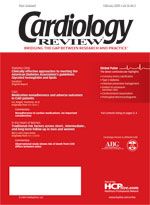Publication
Article
Cardiology Review® Online
Health Outreach Prevention and Empowerment (HOPE) Project joins with the American College of Cardiology to help heal the Gulf Coast
Author(s):
Nineteen months after Hurricane Katrina struck New Orleans, the city still struggles to regain its footing, and residents struggle to adapt to the very changed circumstances of their everyday lives. This is perhaps nowhere more apparent than with the city’s ravaged health care system. As of March 2007, only 5 of the 10 acute care hospitals in Orleans Parish that were open prior to Hurricane Katrina have reopened.
Residents and facilities both traumatized
A stark reminder of how damaged the health care infrastructure in the New Orleans area has become post-Katrina was demonstrated by the thousands of patients who stood in cold, damp, February weather in an outdoor park in Eastern New Orleans to receive basic medical care, including blood pressure tests, basic laboratory values, teeth cleaning, and Pap smears. A lack of primary care—where patients ignore chronic illnesses until crisis arises—is likely the driving force behind the crowds flooding local emergency departments.
A recent report in The Times-Picayune also confirmed that area hospitals are running out of space, with emergency department patients waiting hours for available beds. A March 9, 2007 article noted that hospitals in New Orleans and neighboring Jefferson Parish had been unable to admit patients for more than 1 week, with emergency departments overloaded with respiratory ailments and other seasonal illnesses. Jack Finn, president of the Metropolitan Hospital Counsel was quoted as saying, “We are in crisis in New Orleans…there is not a bed available anywhere in the city.” At the emergency department of Touro Infirmary, one of few major sources of inpatient beds, a typical night’s wait time was listed at 4 to 6 hours, approximately the amount of time it would take to drive to Houston, Texas. However, at other times, the wait may last 7 to 8 hours, equivalent to a road trip to Atlanta, Georgia.
Perhaps more distressing is the shortage in psychiatric care, where resources, including formerly available inpatient psychiatric beds at the now-closed Charity Hospital, are scarce. It is reported that mental health patients are now seen in emergency departments and local jails, no longer receiving appropriate modern mental health care. The March 6, 2007 local Gambit Weekly reported that after Katrina, New Orleans has more “stressed out” citizens than ever before, with fewer psychiatrists and almost no hospital beds to care for the mentally ill. Issues faced by residents include displacement, limited finances, domestic violence, anxiety, depression, living in cramped FEMA trailers, and having the feeling of “nowhere to turn.” Unfortunately, despite living in the richest major country in the world, many citizens see no substantial relief in sight in terms of access to primary care, specialists, and psychiatric care.
“HOPE”ful steps to recovery
Against this backdrop, it is noteworthy that the 56th Annual Scientific Session of the American College of Cardiology (ACC) was held in New Orleans on March 24-27. The conference not only brought needed dollars and jobs to the city, but was also significant for its financial support of the ongoing Health Outreach Prevention and Empowerment (HOPE) Project, a hurricane recovery volunteer network. The project is a collaborative effort between the Association of Black Cardiologists, Inc. (ABC), the Greater New Orleans Medical Foundation of the Orleans Parish Medical Society, the Orleans Medical Society Alliance, and Hands On New Orleans.
As Director of the ABC Hurricane Relief Fund, I have attempted to locate worthy projects and initiatives that continue to assist residents with reconstructing their lives. Some of the more recent awards in 2007 have been used to assist the St. Thomas Community Health Center obtain a 2D mode echocardiograph and treadmill for diagnostic primary cardiology services. St. Thomas Health Center is one of the primary sources of treatment in the New Orleans area for chronic illnesses, including diabetes and hypertension, and it also provides screening mammography and care for other women’s health issues. In addition, HOPE has supported the Common Ground Health Clinic, a non-profit, free primary care initiative that assists with a variety of healthcare needs for the indigent population of the Westbank area. These efforts have included purchasing insulin and establishing a direct action fund, which assists patients with paying for medications, even utilizing a low-cost generic benefit model, medical supplies, and transportation. After a direct visit to the Lower 9th Ward Health Clinic, HOPE has also committed to supporting the operation and growth of this nonprofit organization serving the medically indigent population at no charge. Its mission is to increase access to health care for and improve the health and well-being of all patients while providing free, high-quality, comprehensive, and culturally sensitive health care.
There is no easy solution to the disastrous conditions impacting the New Orleans metropolitan area and the Gulf Coast region post-Katrina. The HOPE Project, however, remains committed to supporting efforts to help move the area towards tangible accomplishments.






